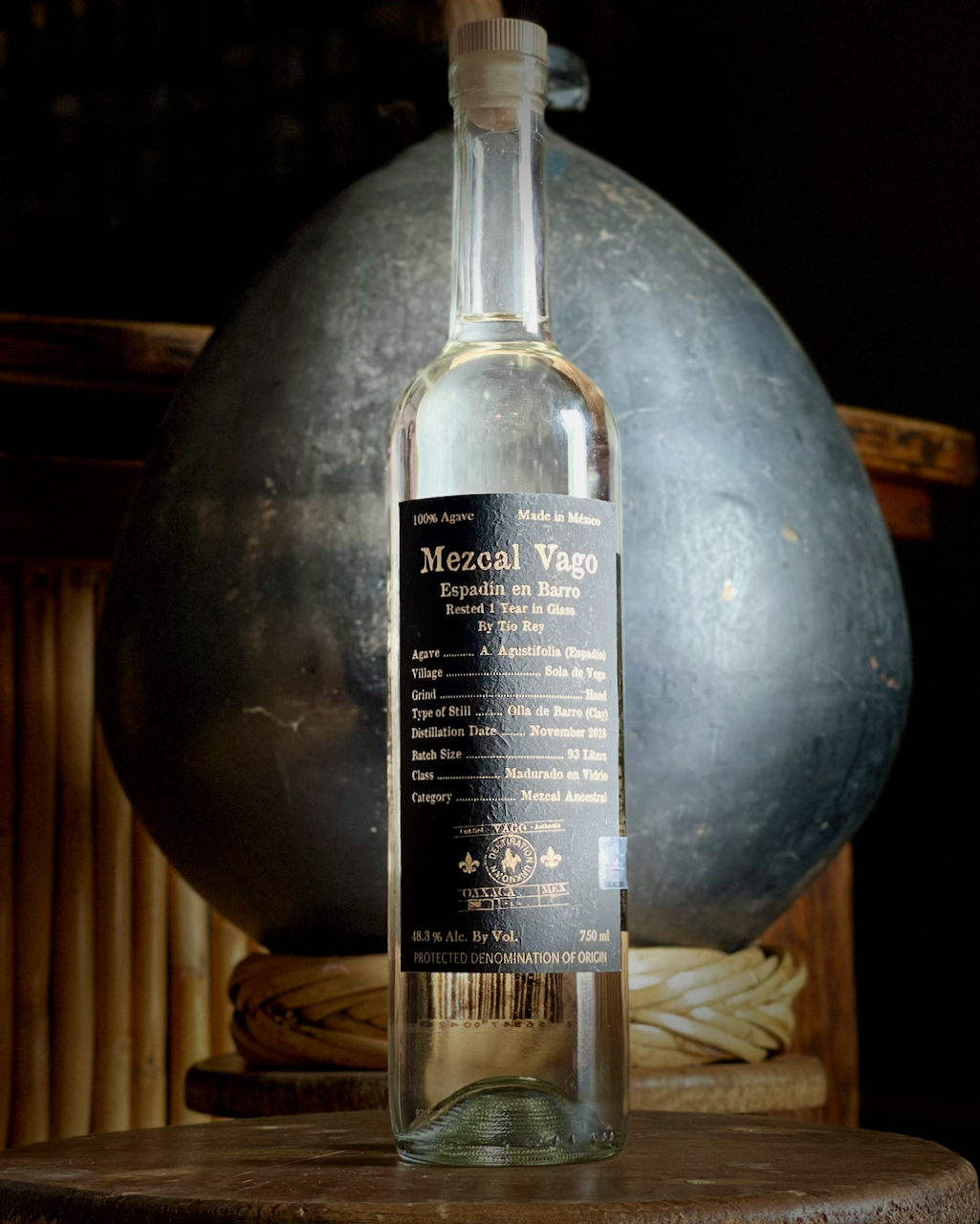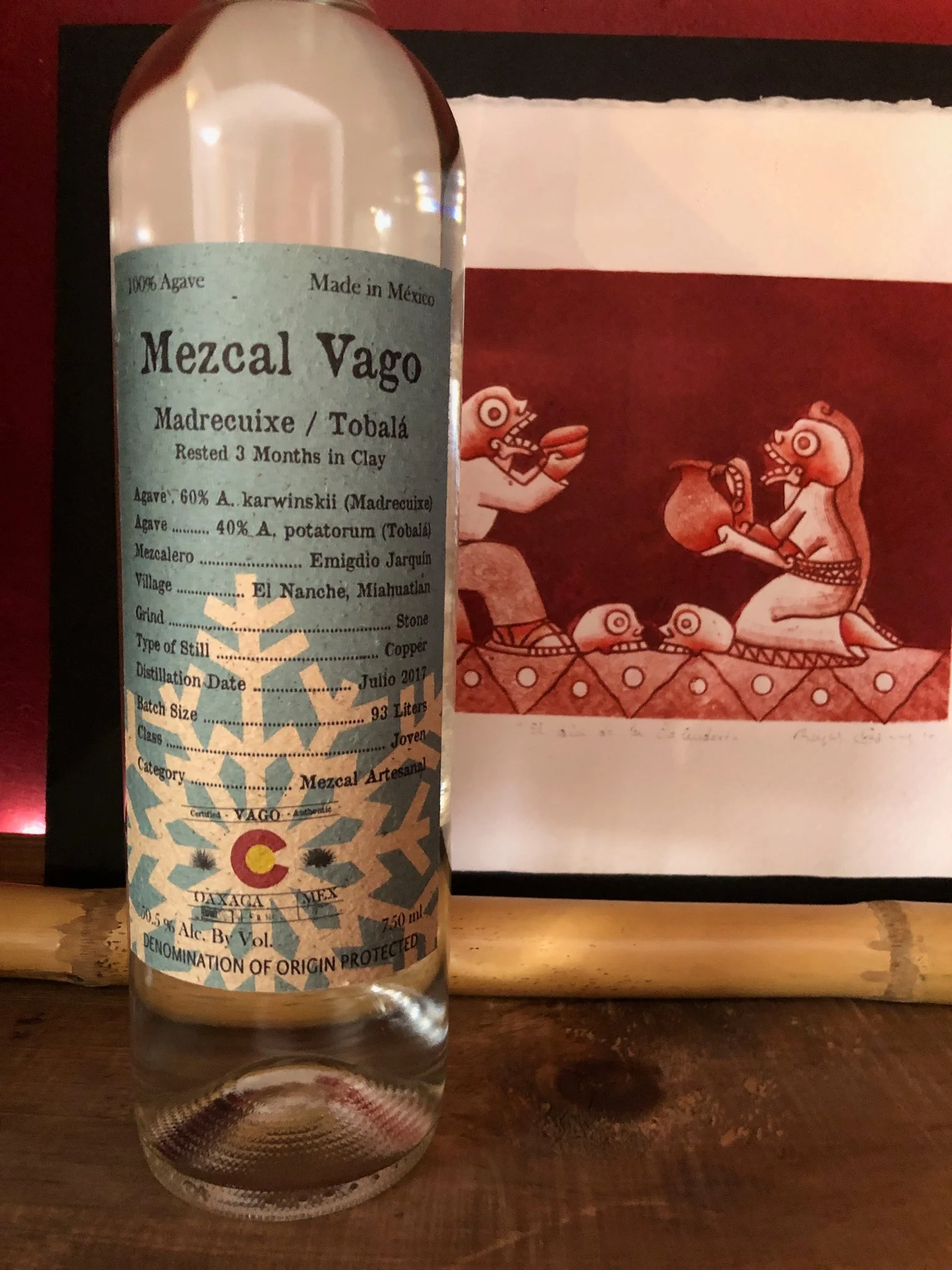NOM-070-SCFI-2016: What is in a Label?
Some of you may have noticed some recent changes to our labels. These changes are a result of the new mezcal regulations that are part of NOM 070-SCIFI-2016. NOM-070 (also known as a ¨Norma’) was put into place in April 2017 in an effort to further regulate and categorize mezcal and make it easier for the consumer to understand what they are purchasing. At Vago, we have always made consumer education and transparency a guiding principle. However, the new Norma did force us to make some changes to our label design. We would also like to take this opportunity to explain some of the changes to the NOM and the classifications for mezcal categories.
100% Maguey
The phrase “100% Maguey,” or “100% Agave” is required to be on every bottle of mezcal that is destined for commercial sale.
Made in Mexico
Brands are now required to either explicitly say “Made in Mexico,” or use the “Eagle’s Head” graphic that indicates production in Mexico on the front label.
Class:
Mezcal Vago has always bottled mezcal that is classified as “Joven,” however the new Norma does include some new categories that bear some explanation.
Blanco or Joven: Mezcal that has not been altered in any way after distillation.
Madurado en Vidrio: Mezcal that has been rested in glass vessels larger than 5 liters for over 12 months either buried underground or in a specialized area that minimizes variations in light, temperature, and humidity.
Reposado: Mezcal that has rested in wooden barrels for two months but not longer than 12 months in a specialized area that minimizes variations in light, temperature, and humidity. There are no specifications or limits regarding the shape or size of the barrels.
Añejo: Mezcal that has rested in wooden barrels for over twelve months in barrels that are no larger than 1,000 liters. They must be rested in in a specialized area that minimizes variations in light, temperature, and humidity.
Abocado con/Infused with: Mezcal that has had ingredients or extracts added to the mezcal post-distillation to contribute flavor. These ingredients can include, but are not limited to: Agave worm, damiana, orange, lime, mango, honey, or others, provided they are authorized by Ministry of Health.
Destilado con/Distilled with: Mezcal that is distilled with ingredients to influence flavor. Ingredients used can include, but are not limited to: Turkey or chicken breast, rabbit, mole, plums, among others. Our Mezcal Vago Elote would fall under this category.
Occasionally, we may release mezcal that has been aged in clay, however, clay aging is not a technique that is classified under the new Nom. In an effort to maintain transparency, we will add an additional line that reads “Rested..” where we will specify the time spent in clay.
Category
According to the new Norma, all mezcal that is certified for sale must be categorized as one of three classes based on how it is cooked, fermented, crushed, and distilled: Mezcal, Artesanal, or Ancestral, with the classification clearly listed on the front label. Everything made by our clay pot producer, Tío Rey, will be classified as Ancestral, while our other three mezcaleros will produce mezcal that is classified as Artesanal. We do not produce mezcal that would be classified as simply Mezcal. While some may feel that certain characteristics belong in one category rather than another, this framework provides clear regulations for how mezcal is to be labeled, and allows educated consumers to know how their mezcal is being produced according to its classification.
The specifications for each category are as follows:
Mezcal
Cooking: Cooking of agave piñas OR juice in underground pits, above ground masonry ovens or autoclaves.
Milling: Tahona, Chilean or Egyptian mill, cane press, chipper, or roller mills.
Fermentation: Fermentation can take place in wood, concrete, or stainless steel vats
Distillation: Alembic still, continuous or column still made from copper or stainless steel.
Mezcal Artesanal
Cooking: Agave piñas must be cooked in underground pits or above ground masonry ovens.
Milling: Wooden mallet, tahona, Chilean/Egyptian mill, cane press, or chipper.
Fermentation: Fermentation can be performed in rock pits, in-ground pits, tree trunks, clay urns, wooden vats, or animal hide. The fermentation may include agave fibers.
Distillation: Distillation must be fueled by direct fire beneath a boiler of either copper or clay. The head or “hat” of the still may be made of clay, wood, copper, or stainless steel.
Mezcal Ancestral
Cooking: Agave piñas must be roasted in underground, earthen pits.
Milling: Roasted agave can only be crushed using wooden mallets, tahona, or a Chilean/Egyptian mill.
Fermentation: Fermentation can only take place in rock pits, in-ground pits, tree trunks, masonry tanks, clay urns, or wooden vats, or animal hide. Process may include fibers.
Distillation: Stills must be fueled by direct fire with boilers constructed of clay, with the head or “hat” of the still constructed of clay or wood.
Denomination of Origin Protected
This exact phrase must be listed on the front label, in a font that is not to be any smaller than 3 mm in height. This phrase is to identify that what is in the bottle was made within the demarcated region for mezcal and according to all laws and regulations dictating its production.
While these label changes may seem marginally significant at first glance, the new regulations reflect the constantly evolving nature of the mezcal industry. As demand has grown, and new brands continue to enter the market, the Consejo Regulador del Mezcal has had to respond by taking steps to regulate and classify the sudden influx of available mezcal. While some of these changes may seem burdensome to some producers, we at Mezcal Vago are proud of the fact that we have always produced mezcal that can be classified as either Artesanal or Ancestral. We further believe that these steps will allow consumers to make educated decisions about what they are spending their money on. While there is no right or wrong way to produce mezcal, we have always strived to be as transparent as possible and support steps that will increase transparency across the industry.








